Understanding and mastering Japanese SEO isn’t easy, but I’ll make it as digestible as possible. I’ll walk you through the key points, using real-life examples to keep things clear.
The good news? You don’t need to be fluent in Japanese to follow along.
What is Japanese SEO?
Let’s first understand what makes Japanese SEO. The way we use the Japanese language is very unique. Japanese uses a mix of three writing systems:
- Kanji
- Hiragana
- Katakana
You might wonder which one to focus on first, but the answer is: all of them.
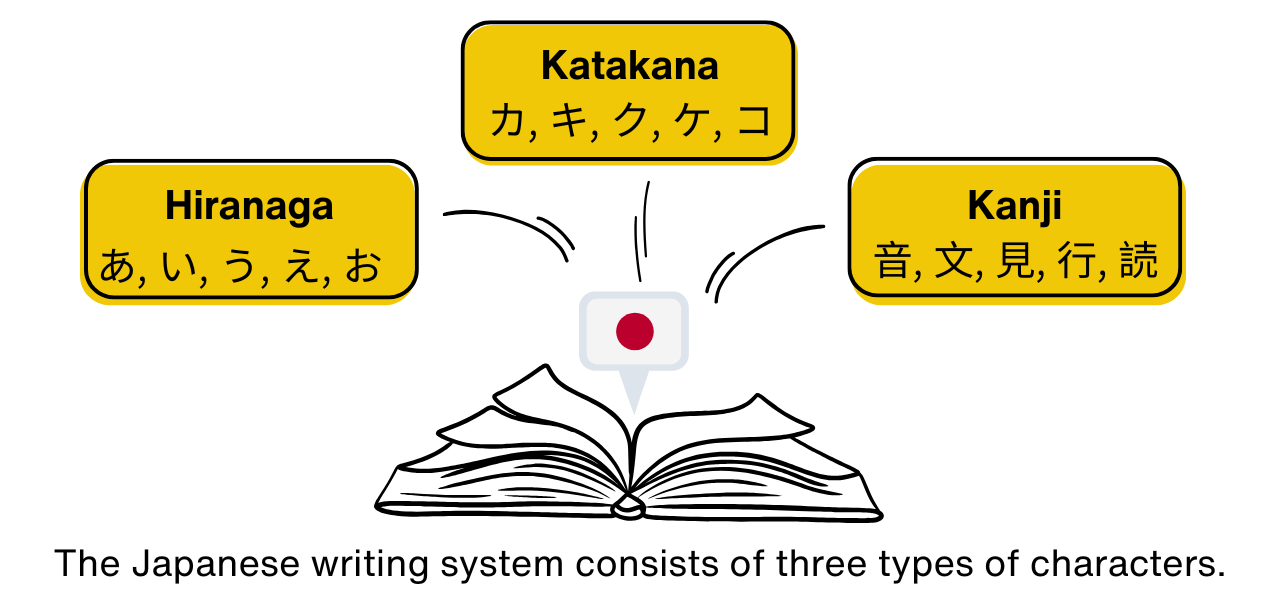
| Type of characters | Usage | SEO Takeaways |
| Kanji | Nouns, roots | High search volume, often core terms |
| Hiragana | Grammar, particles | Helps form natural phrases |
| Katakana | Foreign terms | Used in niche searches or product names |
Here’s the thing: Using only Hiragana makes your writing look childish. Using only Katakana feels unnatural and often doesn’t make sense. Using only Kanji is nearly impossible and would end up looking more like Chinese, which isn’t surprising, as Kanji originates from Chinese characters.
Now you might be confused, but don’t worry, you don’t need to master it.
It’s enough to know that Japanese is made up of three types of characters, which we almost always combine. Once you understand this basic concept, let’s move on.
Japan’s unique culture influences SEO (a lot)
Now that you’ve nailed the first step, let’s talk about Japanese cultural considerations for effective SEO. This is where understanding the Japanese language becomes even more important.
Imagine yourself working on Japanese SEO. Let’s say you have a web page, and you want it to rank for a strong Japanese SEO keyword. What would you do?
You might be tempted to take English keywords from your English page, relying on Google Translate or AI, translate them into Japanese (more about AI Japanese translation here), and call it a day. But that approach doesn’t work.
Let’s correct what went wrong. You translated keywords and assumed you had a great list of Japanese SEO keywords, but that’s wrong. So, what were you supposed to do?
You needed to verify whether the keywords you found were actually relevant. It means the Japanese keywords you got could:
- Be completely irrelevant in meaning (or the intention of users)
- Have zero search volume due to unnatural translation
Sure, you can start with English as a base to brainstorm Japanese keyword ideas, but direct translation rarely produces perfect Japanese SEO. That’s why you need to take extra steps to check and select only the good keywords.
For example, in English, keyword structures like “best + [something]” tend to perform well and have decent monthly search volume. But in Japanese, people don’t often search using the equivalent of “best.” Instead, we tend to use expressions like “おすすめ + [something]” (recommended + something). That’s just how the language works. Simply translating “best” won’t help you find high-performing Japanese keywords.
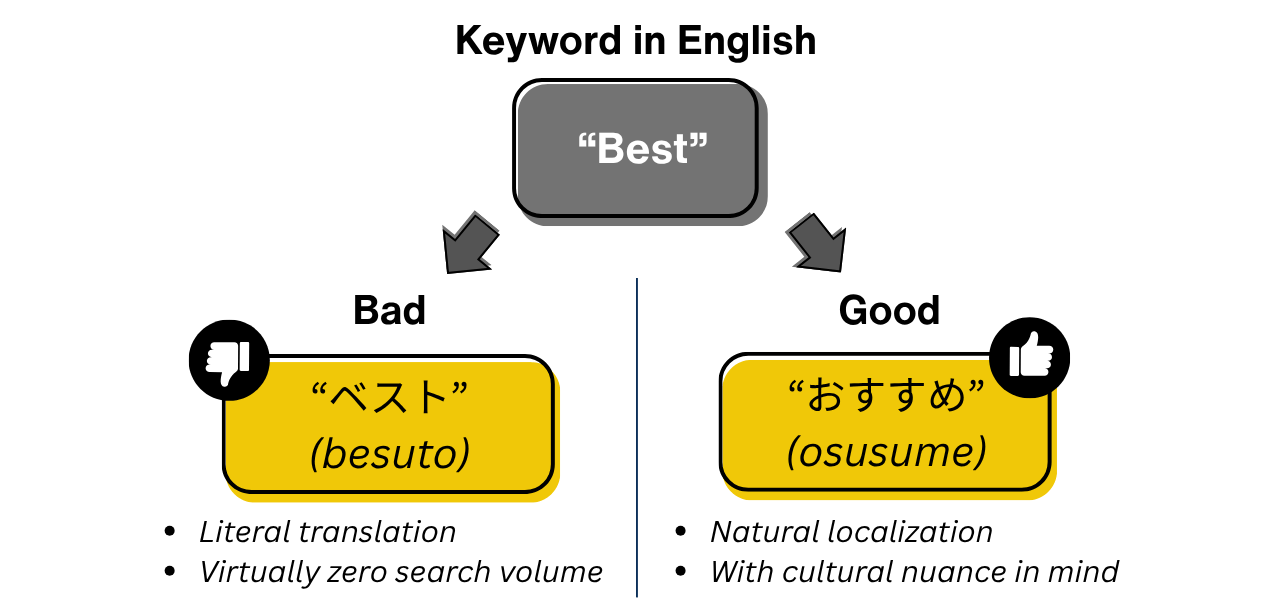
I’ll show you what you can do instead below!
1. Correct keyword research strategies for Japanese SEO
Now, I’m sure you understand what the risky move was. So, what can you do to succeed with Japanese SEO? Can you take action even if you’re not fluent in Japanese?
Well, the good news is that there are things you can do.
One way to get started with Japanese SEO is to use tools that are optimized for the Japanese language. Japanese SEO has its own unique characteristics, and some (actually, many) aspects don’t behave the same way as in English.
One tool I personally recommend is Rakko Keywords (ラッコキーワード – their Japanese website is here), a handy tool developed specifically for the Japanese market. It’s affordable and backed by solid SEO knowledge. Using it to expand your seed keywords and discover new ones in Japanese is a great way to get started quickly.
After logging in, go to the “ラッコキーワード” section (they offer many other tools, but let’s focus on the keyword tool for now).
Type in the keyword you have in mind:
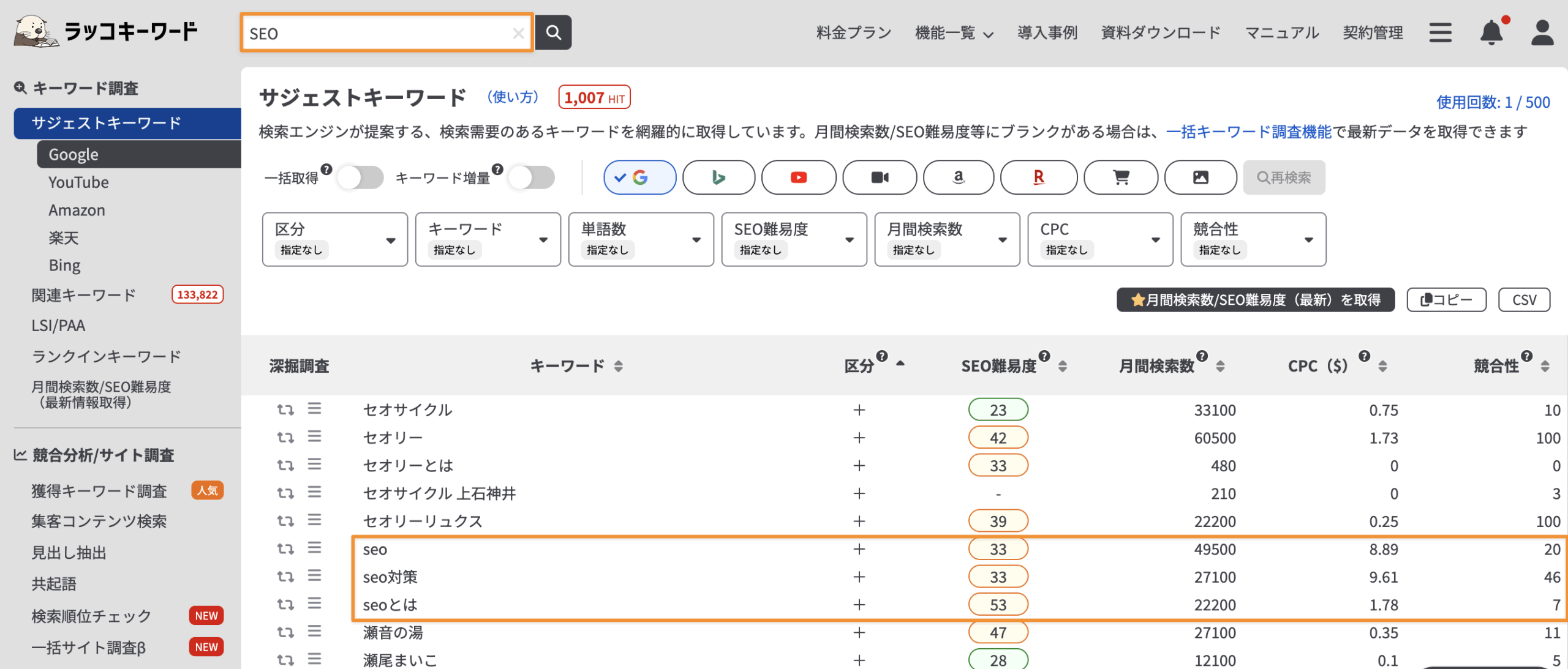
And, as you can see above, you’ll get a list of keywords along with their search volume and competition difficulty.
Here are a few key terms to know:
- SEO難易度: SEO difficulty
- 月間検索数: Monthly search volume
- CPC: Cost per click
- 競合性: Competition
This is a pretty simple workflow, but let me add some steps so you can use the tool effectively.
First of all, I’m assuming you are not fluent in Japanese, and that’s totally fine. The biggest challenge is that you may have no idea which keywords to target. In other words, which ones to ignore and which ones to keep?
For that, the export function comes in handy. As shown in the image below, you’ll see the “コピー” and “CSV” buttons. “コピー” means “copy” and lets you copy all the data in plain text format, which you can then paste into your tool, document, or even ChatGPT directly. CSV is also useful if you want to manipulate the data in Excel or Google Sheets.

After exporting the data (let’s say you chose “copy”), you can paste it into ChatGPT and ask it to translate the keywords. This way, you’ll get the core idea of what each keyword means.
Note: The translation won’t be perfect. When there’s a lack of context, the results tend to be messy. If you encounter questionable keywords, skip them and move on. To investigate those keywords more deeply, you’ll need professional help. Feel free to contact us for assistance.
Use ChatGPT and SEMrush to find Japanese SEO keywords
Another way is to use ChatGPT and give it a few prompts.
Start with your keywords in English, but don’t just automatically translate them and move on (for the same reason I explained earlier). Instead, follow the steps below:
Work in English or your native language and come up with relevant SEO keywords for your niche. And add them to ChatGPT and ask:
“Based on the keywords I provided, create a list of SEO keywords in Japanese and expand it by adding relevant keywords.”
You’ll get a list of Japanese SEO keywords. You might not be sure if the terms are accurate or linguistically correct. That’s totally okay. There are two ways to refine it.
Option 1 — The golden way: Have a professional review your list. At KOTOLI, we help refine the keywords and add more relevant ones tailored to your audience. Great ROI.
Option 2 — DIY check: Upload the list to SEMrush, set the location to Japan, and review the search traffic data. Keywords with no traffic are likely irrelevant or unnatural for Japanese users, which is why they’re not being searched.
Additional note: For the DIY check, you can use the Rakko Keyword tool instead of SEMrush. Either tool you use, the point here is to verify that those potential SEO keywords are actually searched.
An extra layer of checks for the right search context
As I described above, verifying search volume is a solid way to judge the “naturalness” of keywords. If a keyword isn’t natural, Japanese users won’t search for it. Simple formula.
But that’s not the only thing you can do to ensure the quality of your Japanese SEO keywords. Adding another layer of checking is highly recommended, so you don’t waste time creating content for bad keywords.
Here’s what to do: perform a web search. Now that you have a list of Japanese SEO keywords and they’ve passed the search volume test, the next step is to search each keyword one by one.
Copy and paste each keyword into Google and check the first article. To make this easier, you can install the Google Translate extension in Chrome to quickly translate the page. This will give you the gist of the content.
If the topic is related to your niche, keep the keyword. Repeat this process for all keywords.
Faster scanning tip: Grab the titles from the SERP and see what they say. This way, you can quickly weed out keywords that are completely irrelevant.
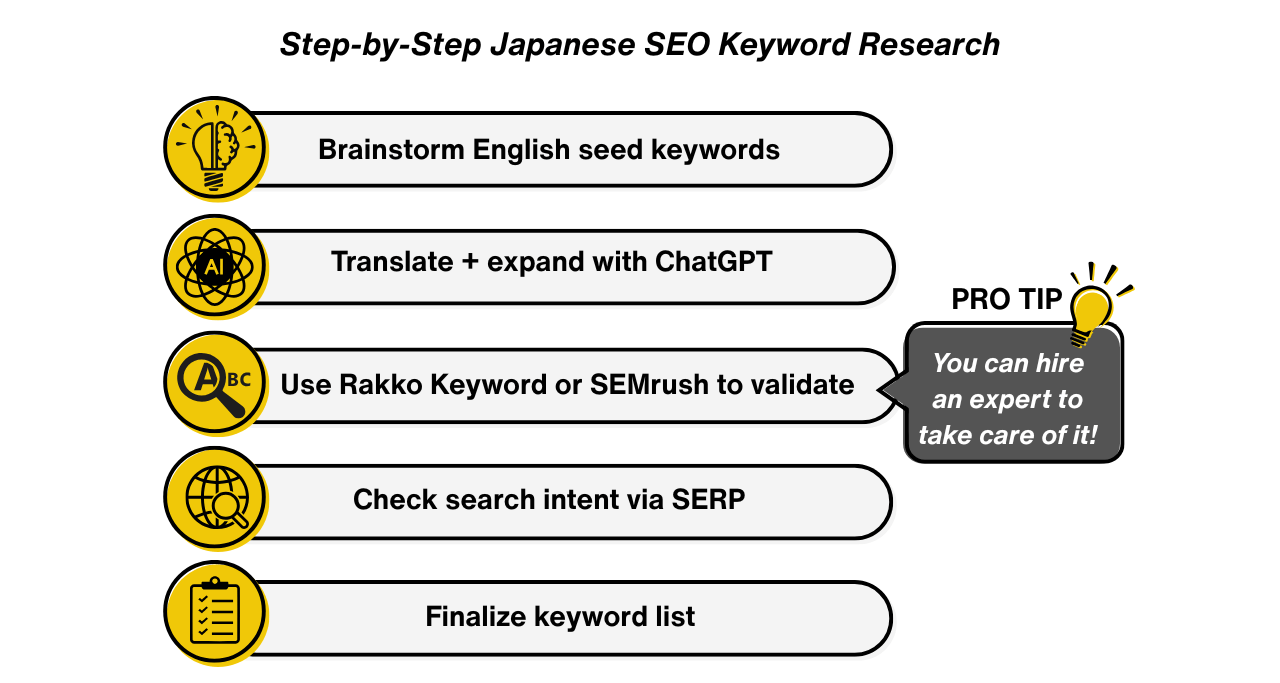
2. How to create Japanese SEO content (with no Japanese knowledge)
Now that you’ve got your list of Japanese SEO keywords, it’s time to learn how to create effective Japanese content. I’ll walk you through the key points.
Can I produce Japanese SEO content?
Well, let’s assume you’re not fluent in Japanese, yet you’re eager to produce Japanese SEO content. That might sound like a challenge, but here’s the good news: there’s a way. I’ll show you how to start creating effective Japanese content, even if you don’t understand the language.
Half-baked Japanese content isn’t received as “Wow, they’re trying hard, I respect that.” Instead, it often comes across as simply unprofessional. So, let’s follow the quality path. It takes more efforts but it’s definitely worth it.
Start with the SEO audience persona and questions
First, go to ChatGPT and feed it the list of keywords you’ve gathered. Then ask:
“Based on these keywords, come up with the searcher persona and the questions they may have related to these search terms.”
You’ll get a detailed description of the persona, essentially, the target audience likely to search for your SEO keywords, along with the questions they want answered.
This step is important because every piece of content should be designed to solve a problem. In web search, users have questions, and they expect your article to provide the answers. That’s why it’s crucial to stay consistent with the overall persona and question structure you develop here.
Once you have this information ready, keep it on hand. We’ll make good use of it in the next step.
Make the SEO content structure
You have the keywords, the persona, and the questions. Now, feed all of them into ChatGPT and ask:
“Based on the keywords, persona, and their questions, create an article structure (with title, H2, and H3) that answers the questions. Make sure to include the keywords in all of them.”
Let the AI do the work, and you’ll get a well‑organized content structure — from the title to H2s and H3s — all optimized with your target keywords.
Now you have a complete framework, along with the keywords to rank for. And the best part? You’ve reached this point without needing Japanese language skills.
Produce the content (meat and potatoes)
Even though you have the structure, it’s nothing if you don’t fill it with content. And yes, I know. You don’t speak Japanese at all. So, what should you do?
I have a few options for you.
Option 1: Hire a Japanese SEO content writer
The great thing about this approach is that you already have the structure. Even if you can’t personally verify the quality, you’ve built it around a solid principle: answering the questions your audience may have.
Most of the time, this means you’re on the right track. But to make sure you’re doing well, I recommend asking the content creator to confirm the structure reads naturally in Japanese. Also, be sure to ask the writer to incorporate the keywords you’ve already identified.
Option 2: Ask ChatGPT to produce the content
If you go with this route, keep in mind that ChatGPT, or any other AI tool, often produces generic content.
To avoid that, I personally recommend writing the content in English (or your native language) first and then translating it into Japanese. This adds another layer of due diligence (ensuring the translation is correct), but it helps keep the content customized and original with your own thoughts woven in.
For the translation, you can partially use AI. For more on this, check out my post about AI vs. human Japanese translation. Hint: A hybrid approach can save you.
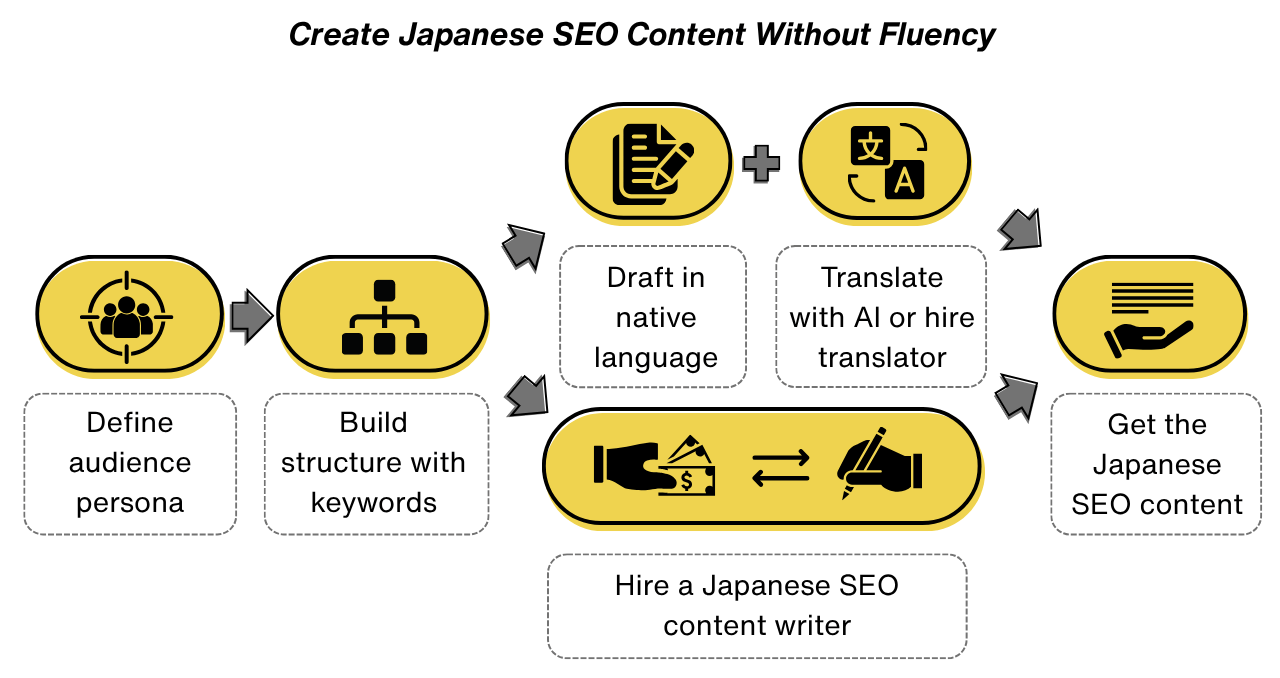
Either way, the basic approach stays the same:
- Build a strong structure based on the persona and their questions
- Ensure the final content is the best possible, incorporating your SEO keywords
Final step: To make sure…
- The quality of the content is high (natural and professional)
- The SEO keywords are properly incorporated
Feel free to contact us.
We’d be happy to verify them for you. We’re curious how you managed to create it, and we’re more than happy to guide you so you can keep moving in the right SEO direction.
3. Common Japanese SEO mistakes to avoid (easy techniques)
I’ve seen many mistakes so far, and I have a solid understanding of what can hurt Japanese SEO.
You need to grasp the importance of following a clear, structured process, instead of simply asking ChatGPT to “create SEO‑friendly content,” which doesn’t work like magic.
What will set you apart is having just a bit more knowledge than the rest.
Recap: Direct translation of English keywords won’t work
Keywords commonly used in English aren’t always used in Japanese. The process I showed you above was designed to detect and remove irrelevant or uncommon phrases. Don’t skip that step. Otherwise, you’ll end up with strange, unnatural keywords that no one searches for in Japanese.
Irrelevant content will be abandoned
Also, note that examples and references in English content often don’t resonate with Japanese readers due to cultural differences. This is about reader engagement.
Even if users start reading your Japanese content, they’ll leave if it doesn’t connect with them. That’s why it’s essential to make your content relatable and culturally appropriate.
Don’t try to stuff SEO keywords
Another common issue I see is when English speakers try to stuff keywords into every heading.
This isn’t just unnecessary. It actively harms the user experience. Japanese readers are quick to notice content that feels inauthentic, and once they sense that, they leave. They won’t shop, trust your product, or want to work with you. This is especially true in the Japanese market, where trust is highly valued.
Unlike in some markets where people might say, “It looks shady, but let’s try it anyway,” Japanese consumers tend to avoid anything that feels suspicious or untrustworthy. Building trust should always be your top priority, not just in SEO, but in all aspects of marketing.
Don’t translate URL slugs
Now, about optimizing URLs for Japanese users. A common mistake non-native speakers make is translating URLs into Japanese in a way that results in unreadable or garbled text. This makes the URLs look unprofessional and hard to share.
Below is an example where the URL slug is accidentally translated. I checked their web page, and it was obvious it had been machine-translated. Most likely, they didn’t know the consequences.

You don’t need to force keywords into URL. That only makes them messy and uncomfortable to use. Instead, keep URLs clean, simple, and easy to remember.
Here’s how bad the rendered URL would look:

When it comes to naturally including keywords, I recommend starting with the questions your readers are asking. List out these questions, write short answers to each, and then build out your article with more details based on those answers. This not only helps with keyword relevance but also creates valuable content that actually serves your audience.
Don’t be ignorant about the culture and language
I know I’ve given you the exact steps to find Japanese SEO keywords and create SEO content with the help of ChatGPT, and it should be effective. But my take is that you should never rely solely on AI. As a pro tip, try to acquaint yourself with Japanese culture and language.
It’s important to understand the jargon used within your target community in Japanese. This depends entirely on your niche. You don’t need to master every term, but you should at least know the key words and phrases your audience commonly uses, not just industry jargon, but the language that truly resonates with them.
For example, the gaming industry is full of unique terminology. If you’re not fluent in this “insider” language, readers will notice immediately.
4. Building quality SEO backlinks in Japan
Backlinks are just as important in the Japanese market as they are in others, and having a solid strategy to acquire them is crucial, especially because it’s more difficult to earn high-quality links in Japan.
Getting Japanese SEO backlinks takes time
It’s hard to say definitively whether it’s more difficult in English or Japanese markets, but in my experience, getting reputable backlinks in Japan is quite tricky. That’s why one of the easiest ways to start is by working with Japanese SEO companies that already have access to valuable link sources. The difficulty often comes down to communication style, which tends to be more closed in Japan.
Let me explain this a bit more. You might assume that bloggers are naturally open and would welcome your outreach email. That’s often true in English-speaking markets, but in Japan, the situation is different. Compared to Western markets, communication in Japan feels more reserved. Many bloggers don’t list their real names, and most don’t provide direct email addresses. Instead, they rely on anonymous contact forms, and it’s not common for them to accept unsolicited inquiries.
Anonymity in the Japanese blogging culture
This reflects a cultural norm: many people in Japan blog under pseudonyms to share things they might not feel comfortable discussing openly. Of course, there are bloggers who use their real names and faces, but I wouldn’t say they’re the majority.
That makes it naturally more difficult to build relationships. Tools like Hunter.io or LinkedIn work well in English-speaking markets to find contacts, but they’re almost useless in Japan. LinkedIn isn’t widely used here. So your best bet is often to visit each blog’s contact page and submit a message through their form, which can be time-consuming. On top of that, Japanese bloggers tend to be cautious about linking to external websites. So instead of a cold pitch like “You should link to this blog post, I’m sure it’s helpful for your audience,” you’ll need a much more personal and respectful approach.
Importance of local long-term collaborations
In the Japanese market, authenticity, respect, and trust are everything. If you focus on building that foundation, your link-building efforts will be much more successful. Successful link building in Japan is built on long-term relationships. You should invest time in building genuine connections with bloggers, site owners, and businesses.
One of my favorite ways to do this is through offline events. Yes, they take more effort, but showing up in person adds authenticity and demonstrates that you’re serious about the connection.
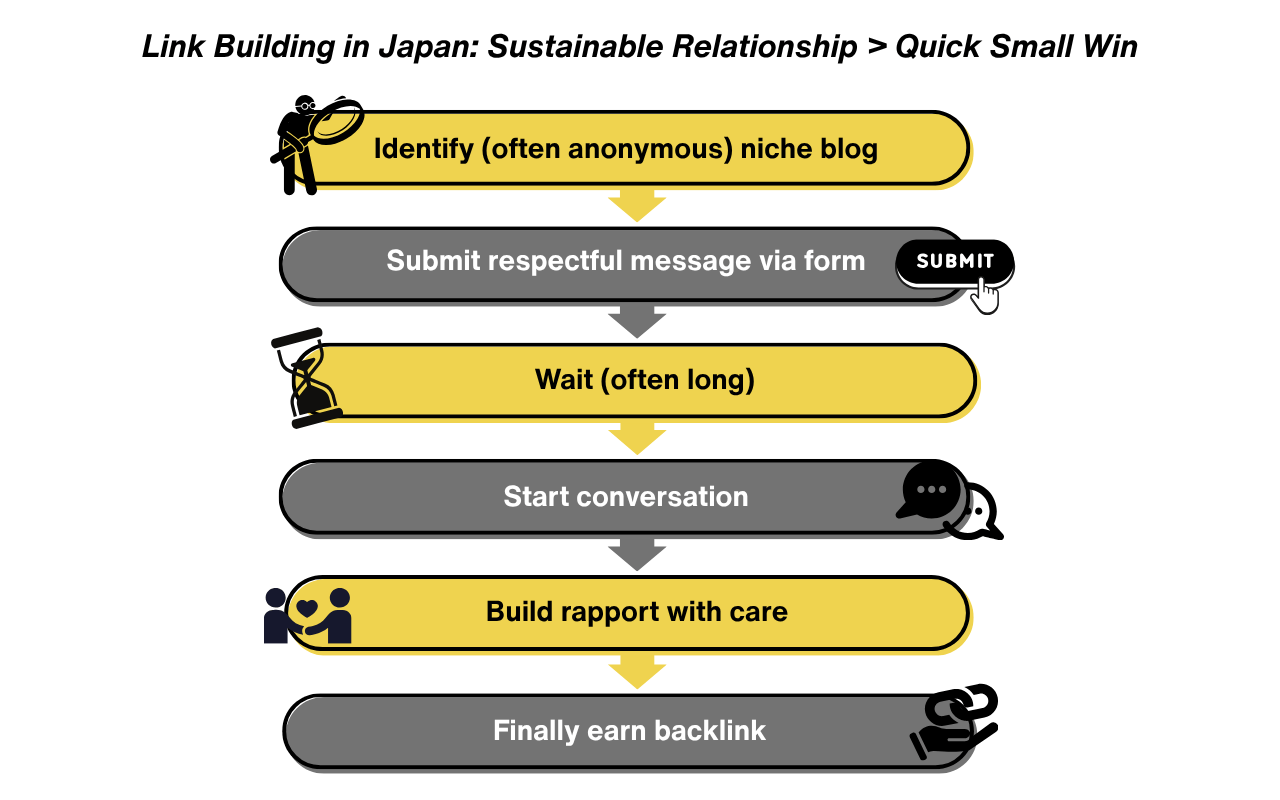
5. Choosing the right Japanese SEO agency for you
All of the complexities I’ve mentioned so far come down to one key idea: you need a great guide, or better yet, you may want to hand over the entire task to a professional or a team of experts.
So let’s look at what to consider when choosing an SEO company in Japan.
First and foremost, check whether the agency is well-versed in SEO specifically for the Japanese market. General SEO skills are not enough. Without specialization in the Japanese context, you’ll quickly run into major roadblocks, whether it’s in link building, keyword research, or on-site SEO.
Expertise in the Japanese market should also come with a business-oriented mindset. After all, SEO is not a siloed activity. It’s part of your larger business strategy. If SEO is treated as separate from everything else, it becomes disconnected and ineffective. It’s like having departments that never collaborate. No synergy, no results.
Another important quality to look for is the agency’s ability to understand your specific goals and translate them into an SEO roadmap. That means they should take the time to understand your business objectives at every level, from the high-level vision to day-to-day KPIs, and then develop a tailored SEO plan to support them.
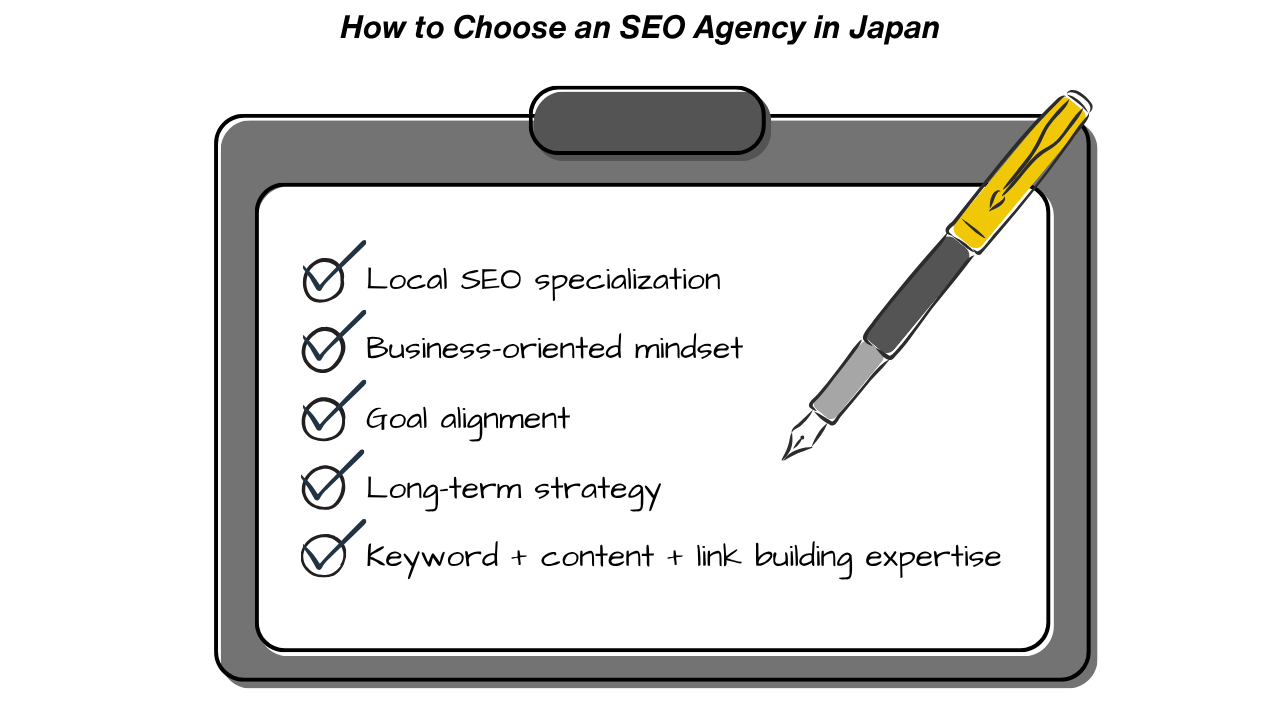
At KOTOLI, we do exactly that. We take the time to deeply understand your business strategy, or even help you define it, then build a custom SEO approach that fits seamlessly into your overall marketing and business plan. The result? Every part of your business works together like a perfectly designed machine, with SEO driving measurable growth, not just rankings.
Conclusion
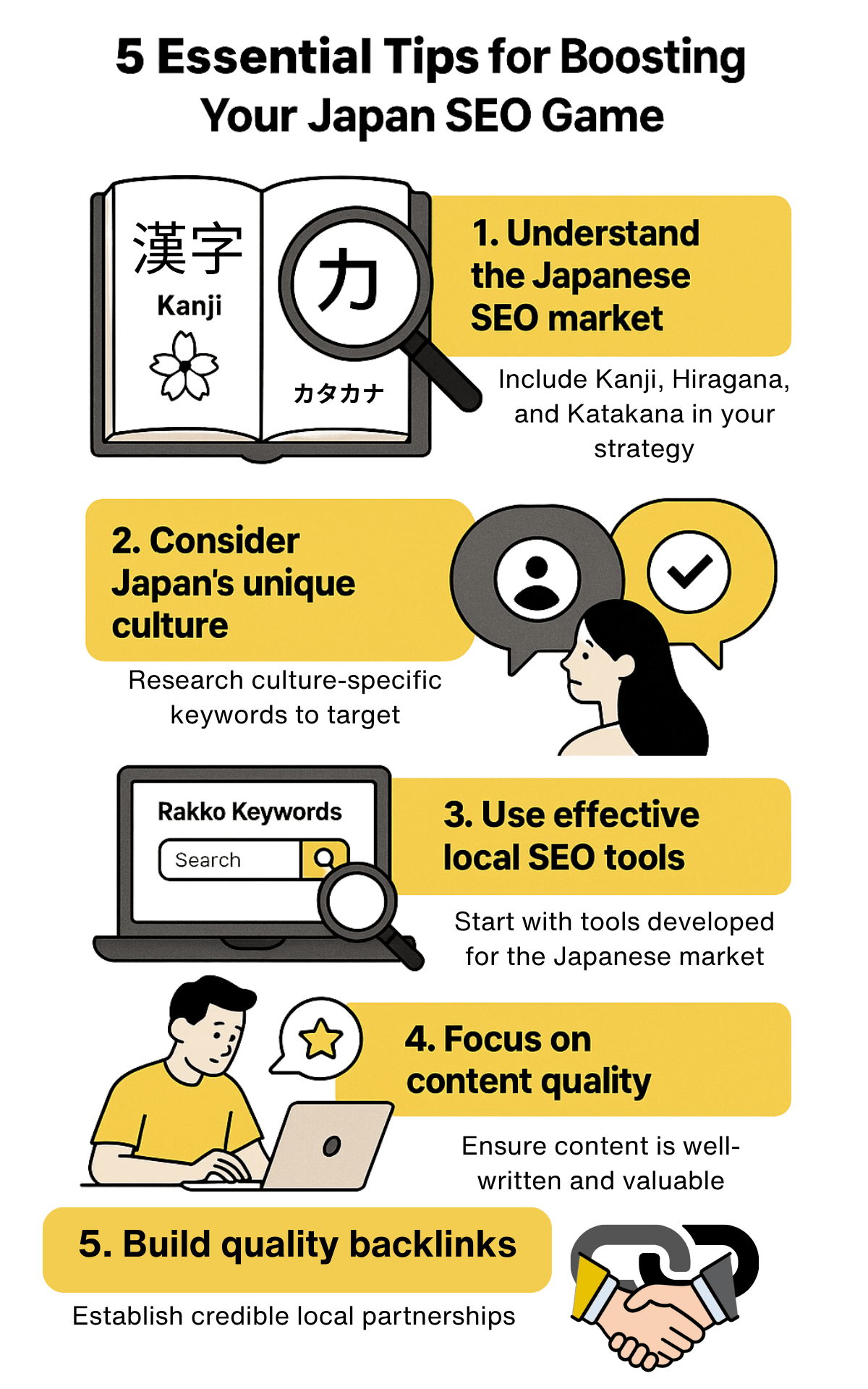
Breaking into the Japanese market with SEO is no easy task, but it’s far from impossible. With a deep understanding of language nuances, cultural behaviors, local keyword strategy, and relationship-driven link building, you can build a strong foundation for sustainable growth in Japan.
From choosing the right keywords and tools, to crafting culturally appropriate content, to building trust through authenticity. Every step matters. And while the path may seem complex, it becomes much more manageable with the right knowledge, mindset, and partners.
Whether you’re just starting or looking to refine your approach, one thing is clear: succeeding in Japanese SEO takes more than translation, it takes true localization, long-term thinking, and strategic execution.
At KOTOLI, we specialize in exactly that. If you’re serious about growing in Japan, let’s build something that works, together. Contact us today!

Founder of Kotoli, an agency specializing in helping international businesses enter and succeed in the Japanese market, from higher-level strategic positioning, business management, and market fit, to more tactical marketing implementations such as ads, SEO, content marketing, and localization.
